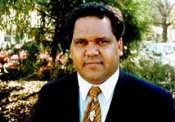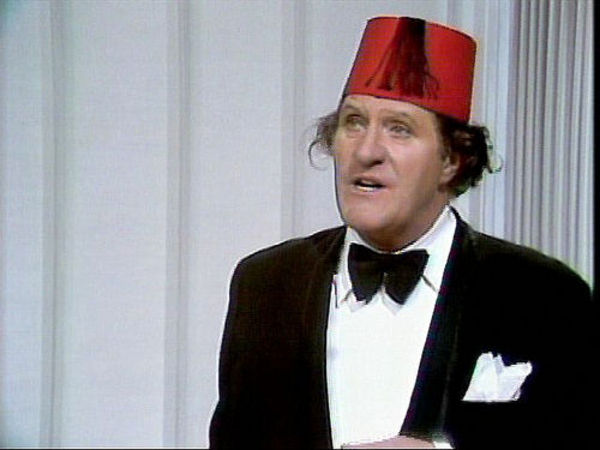The arty-farties are overwhelmingly Leftist anyway so it is little wonder that conservative politicians give them little heed

The Howard Government MPs are philistines obsessed with sport at the expense of the nation's art and culture, says Labor MP Peter Garrett. He singled out PM John Howard, Treasurer Peter Costello and Health Minister Tony Abbott as the worst offenders. Ministers regularly turned down invitations to attend art and cultural events, he said, preferring instead to bask in the reflected glory of football and cricket stars.
The PM was a cricket tragic, but the Government did not have an equivalent theatre tragic, Mr Garrett said at Monash University. "Can you remember the last time the Prime Minister or the Treasurer offered up their view on the value of creativity, of encouraging expression, of the importance of telling our own stories," he said. "It is no secret that the number of unmet invitations to senior government ministers to arts events continues to pile up to the roof. "Yet attendance at the various football codes is de rigeur for pollies of all persuasions."
A spokeswoman for Mr Costello, an avid Bombers fan, rejected the former Midnight Oil singer's critique. "The Treasurer is a man for all seasons -- the cricket season, the football season, the racing season, and the literary season," she said.
Mr Abbott came in for special mention over his comment several years ago that parliament house's art collection was avant-garde crap. Mr Garrett said it was "as good an expression of philistinism as you'd ever see". The recent Picasso exhibition in Melbourne drew enormous crowds and showed up Mr Abbott's ignorance. A spokeswoman for Mr Abbott said he visited galleries from time to time. Although Mr Abbott was not a ballet goer he did recently attend a live performance of Dancing on Ice.
Mr Garrett, Labor's spokesman for the arts, said many artists earned as little as $17,000 a year and had to live hand-to-mouth, week by week.
Source
"Pommy" Still Allowable -- Just
It's OK to call a Pom a Pom at the cricket this summer - as long as it is in good humour. Cricket Australia has given the green light to Aussies chastising the enemy during the Ashes series, but not if it's nasty. According to the Human Rights and Equal Opportunity Commission, the word Pom or Pommy itself is not offensive -- it depends on how it is used. The origin of the word Pom is unclear, with theories ranging from a short form of pomegranate to an acronym for Prisoner of her Majesty.
Cricket Australia anti-racism officer Peter Young said he did not expect Test fans to be kicked out of the MCG for calling the English Poms. "But if it was used to denigrate, demean, disparage or be offensive to another person on the basis of their race or culture, then it is a problem," he said. "People will use the word Pommy, players will use the word Pommy. But our view is, and has always been, that we take a zero-tolerance approach to racism in cricket, whether it is on the field or off the field, whether it is at an elite level or whether it is in the local school yard. "There is no place for racism in cricket."
A Barmy Army [English fans] spokesman said they didn't feel there were any problems with being called Poms. "As long as being called a Pom isn't accompanied by anything abusive then the Barmy Army has no problem whatsoever," he said. "We have been called it on the last three tours and we see it as a bit of harmless banter. "The Barmy Army likens it to calling Australians convicts, it is just a bit of fun and humour."
Under the International Cricket Council anti-racism code adopted this week, fans found guilty of racial abuse at matches could face lifetime bans.
Source
Destructive drug
The head of the nation's biggest police service has warned that Australia risks losing a generation of young people to the drug ice. New South Wales Police Commissioner Ken Moroney believes ice, an amphetamine in crystal form, is a bigger problem than heroin and the greatest scourge faced by the community that he has seen in his 41-year career.
In a wide-ranging interview with The Australian, Mr Moroney spelt out his priorities for his final 12 months as head of the world's fifth-biggest police force. He blamed Sydney's outbreaks of anti-social behaviour such as the Cronulla riots on a lack of manners and values among the young. And while terrorism was a priority for him, Mr Moroney believed ordinary people were more worried about mundane crimes such as assault and robbery.
Mr Moroney will retire at the end of August next year after five years in the job. He believes his last year will be his busiest as he attempts to establish a new state-of-the-art command college modelled on the US Federal Bureau of Investigation's elite training facility, Quantico.
Mr Moroney also wants to do more to reduce crimes that create fear in the community, which he does not believe mean terrorism. "I don't think those things are at a higher order than, say, those ordinary things that worry the public, and that's where I've got to concentrate," he says. "The things the mums and dads want me to concentrate on, the safety of their homes, their vehicle and the safety and security of their immediate family."
Despite race issues being highlighted in the aftermath of rioting in Sydney in recent years, particularly at Redfern and Cronulla, Mr Moroney says alcohol abuse and a lack of manners among young people were to blame. "What I see is an absence of common courtesies," he says. "There's been an enormous shift in the Australian values of respect for each other." With summer approaching, Mr Moroney says there would be another increase in anti-social behaviour through to March. He says he is focusing on reducing the fear of crime, particularly for the elderly and young.
However, Mr Moroney says the greatest challenge facing NSW police is the ice epidemic. "I don't know, in all of the time I've been a policeman, which is 41 years, of a greater scourge on the community," he says. "The physical and mental manifestations of this drug are absolutely horrific. It has the potential to destroy generations." He says he believes one could draw a link to ice in a majority of personal violence and robbery offences.
His comments follow a joint parliamentary inquiry into amphetamines and other drugs which warned in June that Australia would continue to lose the war on drugs while policies kept targeting users instead of suppliers. The inquiry heard that ecstasy use had almost tripled in the past 13 years, with 3.4 per cent of Australians having used the drug in the previous year, while users of amphetamines increased from 2 per cent to 3.2 per cent. The Australian Federal Police said most amphetamines were made domestically, but agencies were seeing increased imports of concentrated forms of the drug, such as ice.
As Commissioner, Mr Moroney says he likes to go out in public as much as he can. He says he has walked down to St Vincent's Hospital in Sydney where there is a special ward for drug-affected patients having ice-induced psychotic episodes. "It's just frightening, it's just absolutely frightening," he says.
As he goes into his last year in the job, Mr Moroney says his greatest disappointment is the recent scandal at the NSW Police College involving lecturers fraternising with students. "I've never been so personally disappointed in my life," he says
Source
Drawing the line on cross-border rivalry

Despite occasional banter about banana-benders and cockroaches, members of a joint NSW-Queensland team are getting on famously in their historic survey of the border between the two states. The modern survey is a far cry from the original expedition more than 120 years ago when the team leaders from each state were at each other's throats, and the Queenslander quit in disgust.
When the 21st-century expedition began its trek on Monday through the scrubland at the Queensland border town of Hebel, 550km southwest of Brisbane, one of the NSW surveyors turned up in a blue State of Origin rugby league jersey. "He copped a lot of flak from the Queensland fellas," said Bob Jenkins, the senior Queensland surveyor with the expedition. "But it was all just friendly banter," his NSW counterpart, Graeme Stewart, added quickly.
The survey team is using a mix of traditional methods and satellite technology to redefine the original border set by NSW surveyor John Cameron and his Queensland counterpart, George Watson, between 1879 and 1891.
The relaxed camaraderie shown by the team leaders when The Weekend Australian caught up with the expedition this week was a vast improvement on the poisonous relationship between the 19th-century surveyors. "The Queensland Officer and I don't hit it very well," Cameron wrote shortly after the joint team set off from the NSW town of Barringun, 200km west of Hebel. Things got so bad that Watson withdrew his team 160km into the 450km journey to the South Australian border. In a letter to the Queensland surveyor-general before he pulled out, Watson wrote that Cameron had "a supreme regard for his own reputation". Cameron and his NSW team pushed on, battling drought, floods and scurvy until they reached the South Australian border at the spot now known as Camerons Corner. They then returned to Barringun and headed east, surveying the 320km stretch to Mungindi.
The modern team is now on its fourth two-week survey since 2001, when they set out from Barringun. They hope to reach Mungindi by the end of next week, and will start surveying the Barringun-Camerons Corner stretch next year. Mr Jenkins said the modern survey was necessary because many of the border posts erected by the 19th-century surveyors had rotted away or been lost in bushfires and land-clearing. "In some areas there's uncertainty about where the border actually is," he said. Mr Stewart said the survey's main benefit would be to give landholders on both sides of the border greater security of tenure. "It's also important for the two state governments to know the exact boundaries of Crown land and national parks on both sides of the border," he said. "With modern technology, we can fix the border for all time."
Asked why there were six NSW surveyors and three Queenslanders on the team, Mr Jenkins couldn't resist a dig. "It only takes one Queenslander to do the work of two New South Welshmen," he said. Queensland Premier Peter Beattie has entered the fray, claiming NSW has stolen land that his surveyors will reclaim for the Sunshine State. But while Mr Beattie often boasts how 1500 people a week move to Queensland, he was not expecting the border changes to involve residents shifting states.
Source
 Australian Politics
Australian Politics















 Evelyn Rae, a conservative Australian political commentator
Evelyn Rae, a conservative Australian political commentator


 Margo Robbie -- a beautiful australian
Margo Robbie -- a beautiful australian
 My son Joe at ANU
My son Joe at ANU
 One of the happiest pictures ever -- Cleo Smith, aged 4
One of the happiest pictures ever -- Cleo Smith, aged 4




